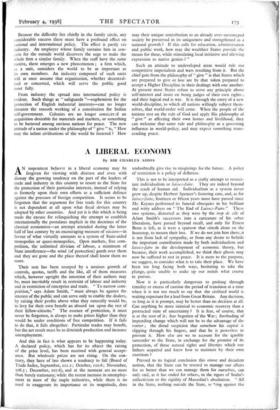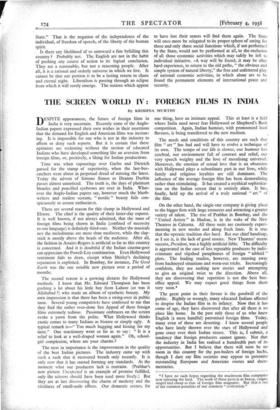A LIBERAL ECONOMY
By SIR CHARLES ADDIS AN impenitent believer in a liberal economy may be forgiven for viewing with distrust and even with dismay the growing tendency on the part of the leaders of trade and industry in this country to resort to the State for the protection of their particular interests, instead of relying as formerly upon their own efforts as a sufficient defence against the pressure of foreign competition. It seems to be forgotten that the argument for free trade for this country is not dependent at all upon what fiscal devices may be adopted by other countries. And yet it is this which is being made the excuse for relinquishing the attempt to 'establish internationally the postulates implicit in the doctrines of the classical economists—an attempt attended during the latter half of Iasi century by an encouraging measure of success—in favour of what virtually amounts to a system of State-aided monopolies or quasi-monopolies., Open markets, free com- petition, the' ardimited division of labour, a minimum of State interference—the wind (of protection) goeth over them and they are gone and the place thereof shall know them no more.
Their seat has been usurped by a noxious growth of controls, quotas, tariffs and the like, all of them measures which, however upright the intention of their authors may be, must inevitably result in restraint of labour and industry and in restriction of enterprise and trade. "To narrow com- petition," says Adam Smith, "must always be against the interest of the public and can serve only to enable the dealers, by raising. their profits above what they naturally would be, to levy for their own benefit an absurd tax upon the rest of their fellow-dtizeirs." The essence of protection, it -must never he forgotten, is always to make prices higher than they would be under conditions of free competition. If it fails to do that, it fails altogether. Particular trades may benefit, but the net result must be to diminish production and increase unemployment.
And this in fact is what appears to be happening today. A declared policy, which has for its object the raising of the price level, has been received with general accept- ance. But wholesale prices are not rising. On the con- trary, they have of late shown a tendency to fall (Board of Trade Index, September, I.2 ; October, r ro.6 ; November, 108.5; December, 107.6), and at the moment are no more than barely stationary; while the recent increase in unemploy- ment in most of the staple industries, while there is no need to exaggerate its importance or its magnitude, does undoubtedly give rise to misgivings for the future. A policy of restriction is a policy of deflation.
This is not to be interpreted as a crafty attempt to resusci- tate individualism or laissez-faire. They are indeed beyond the reach of human aid. Individualism as a system never grew up, despite Herbert Spencer's fostering care, and, as for laissez-faire, fourteen or fifteen years must have passed since Mr. Keynes performed its funeral obsequies in his brilliant and witty address on "The End of Laissez-Faire." These two systems, distorted as they were by .the trop de zele of Adam Smith's successors into a caricature of his sober liberalism, have passed. beyond recall, and only Sir Ernest Bean is left, as it were a sparrow that sitteth alone on the housetop, to mourn their loss. If we do not join him there, it is not from lack of sympathy, or from any desire to belittle the important contribution made by both individualism and laissez-faire to the development of economic theory, but because, their work accomplished, we think their ghosts may now be suffered to rest in peace. It is more to the purpose, we suggest, to consider what is to take their place. We have been too long facing both ways, hesitating to take the plunge, quite unable to make up our minds what course to pursue.
Now it is particularly dangerous to prolong through timidity or excess of caution the period of transition at a time when it is not too much to say that the civilised world is waiting expectant for a lead from Great Britain. Any decision, so long as it is prompt, may be better than no decision at all. Can anything be more inimical to economic recovery than a protracted state of uncertainty ? It is fear, of course, that is at the root of it; fear begotten of the War; foreboding of impending change which will not be to the advantage of the rentier ; the dread suspicion that somehow his capital is slipping through his fingers, and that he is powerless to prevent it. How else are we to account for the ignoble surrender to the State, in exchange for the promise of its protection, of those natural rights and liberties which our fathers acquired and knew how to maintain by their own exertions ?
Pressed to its logical conclusion this otiose and decadent notion, that the State can be trusted to manage our affairs for us better than we can manage them for ourselves, can only end, as it has ended for others, in the rigors of Stalin's collectivism or the rigidity of Mussolini's absolutism. "All in the State, nothing outside the State, ncbing against the State." That is the negation of the independence of the individual, of freedom of speech, of the liberty of the human spirit.
. Is there any likelihood of so untoward a fate befalling this country ? Probably not. The English are not in the habit of pushing any course of action to its logical conclusion. They are a reasonable, but not a reasoning people. After all, it is a rational and orderly universe in which we live. It cannot be that our portion is to be a lasting return to chaos and eternal night. Liberalism is passing through an eclipse from which it will surely emerge. The nations which appear to have lost their senses will find them again. The State will once more be relegated to its proper sphere of caring for those and only those social functions which, if not performed by the State, would not be performed at all, to the exclusion of all those economic activities which may safely be left to individual initiative. -A way will be found, „it may be after hard experience, to return to the old paths, "the obvious and simple system of natural liberty," the free and unfettered play of national economic activities, in which alone are to be found the permanent elements of international peace and security.















































 Previous page
Previous page